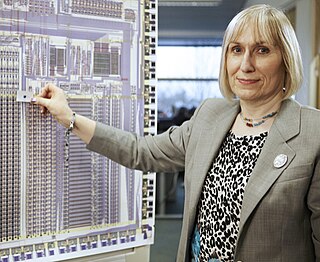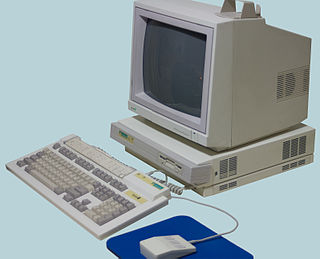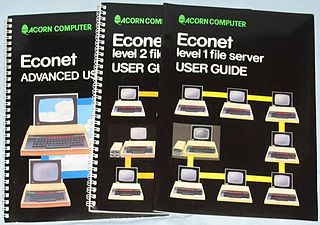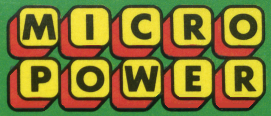
The Acorn Electron was a lower-cost alternative to the BBC Micro educational/home computer, also developed by Acorn Computers, to provide many of the features of that more expensive machine at a price more competitive with that of the ZX Spectrum. It had 32 kilobytes of RAM, and its ROM included BBC BASIC II together with the operating system. Announced in 1982 for a possible release the same year, it was eventually introduced on 25 August 1983 priced at £199.
BBC BASIC is an interpreted version of the BASIC programming language. It was developed by Acorn Computers Ltd when they were selected by the BBC to supply the computer for their BBC Literacy Project in 1981.

Acorn Computers Ltd. was a British computer company established in Cambridge, England in 1978 by Hermann Hauser, Chris Curry and Andy Hopper. The company produced a number of computers during the 1980s with associated software that were highly popular in the domestic market, and they have been historically influential in the development of computer technology like processors.

Sophie Mary Wilson is an English computer scientist, a co-designer of the Instruction Set for the ARM architecture.

The Acorn Archimedes is a family of personal computers designed by Acorn Computers of Cambridge, England. The systems in this family use Acorn's own ARM architecture processors and initially ran the Arthur operating system, with later models introducing RISC OS and, in a separate workstation range, RISC iX. The first Archimedes models were introduced in 1987, and systems in the Archimedes family were sold until the mid-1990s alongside Acorn's newer Risc PC and A7000 models.
Acornsoft was the software arm of Acorn Computers, and a major publisher of software for the BBC Micro and Acorn Electron. As well as games, it also produced a large number of educational titles, extra computer languages and business and utility packages – these included word processor VIEW and the spreadsheet ViewSheet supplied on ROM and cartridge for the BBC Micro/Acorn Electron and included as standard in the BBC Master and Acorn Business Computer.

Econet was Acorn Computers's low-cost local area network system, based on a CSMA-CD serial protocol carried over a five-wire data bus, intended for use by schools and small businesses. It was widely used in those areas, and was supported by a large number of different computer and server systems produced both by Acorn and by other companies.
The Fourth Dimension (4D) was a major video game publisher for the BBC Micro, Acorn Electron, Acorn Archimedes and RiscPC between 1989 and 1998. Previously, The Fourth Dimension had been known as Impact Software, which specialised mainly in BBC Micro games. Some of 4D's staff had worked for Superior Software. Notable release included Cyber Chess, Stunt Racer 2000, Galactic Dan and Chocks Away.

Micro Power was a British company established in the early 1980s by former accountant Bob Simpson. The company was best known as a video game publisher, originally under the name Program Power. It also sold many types of computer hardware and software through its Leeds 'showroom' or via mail order.

Electron User was a magazine targeted at owners of the Acorn Electron microcomputer. It was published by Database Publications of Stockport, starting in October 1983 and ending after 82 issues in July 1990.

Acorn User magazine was founded by Acorn Computers in 1982, contract-published by Addison-Wesley, to coincide with the launch of the BBC Micro. It covered the range of Acorn home computers, the BBC Micro and Atom at first and later the Electron, Archimedes and Risc PC.

The BBC Microcomputer System, or BBC Micro, is a series of microcomputers designed and built by Acorn Computers Limited in the 1980s for the Computer Literacy Project of the BBC. The machine was the focus of a number of educational BBC TV programmes on computer literacy, starting with The Computer Programme in 1982, followed by Making the Most of the Micro, Computers in Control in 1983, and finally Micro Live in 1985.

Fun School is a series of educational packages developed and published in the United Kingdom by Europress Software, initially as Database Educational Software. The original Fun School titles were sold mostly by mail order via off-the-page adverts in the magazines owned by Database Publications. A decision was made to create a new set of programs, call the range Fun School 2, and package them more professionally so they could be sold in computer stores around the UK. Every game comes as a set of three versions, each version set to cater for a specific age range.

Acornsoft LISP is a dialect and commercial implementation of the Lisp programming language, released in the early 1980s for the 8-bit Acorn Atom, BBC Micro and Acorn Electron computers.

Deathstar is multidirectional shooter for the Acorn Electron and BBC Micro developed by Peter Johnson and originally published in the UK by Superior Software in 1985. It is a clone of the arcade game Sinistar.
The Advanced Disc Filing System (ADFS) is a computing file system unique to the Acorn computer range and RISC OS-based successors. Initially based on the rare Acorn Winchester Filing System, it was renamed to the Advanced Disc Filing System when support for floppy discs was added and on later 32-bit systems a variant of a PC-style floppy controller.
Gordon J. Key authored video game software for the Acorn BBC Micro, Electron and RISC OS platforms in the 1980s and 1990s. His most well-known works were published by The Fourth Dimension. He is also credited with additional programming routines in FedNet's futuristic flight combat game Star Fighter 3000 (1994), and authored Party Machine for the Amstrad CPC.

Archive is a membership magazine for users of the Acorn Archimedes personal computer and related RISC OS hardware. It is the oldest and longest-running RISC OS magazine.

BEEBUG was a magazine published for users of the BBC Micro between 1982 and 1994. It was the first subscription magazine for computers made by Acorn Computers.














